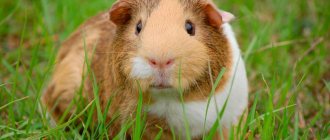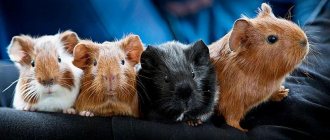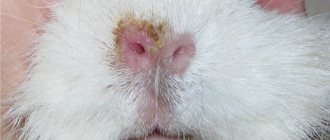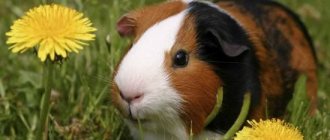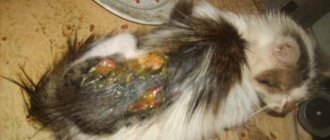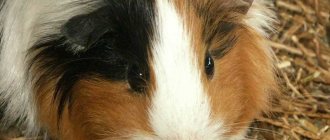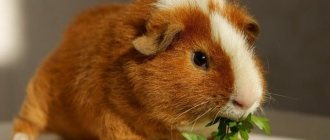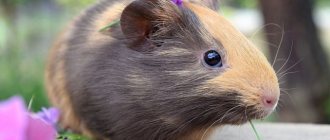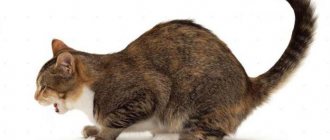All pig sounds have meaning and are a way of communication. With the help of its voice, a guinea pig shows its dissatisfaction, asks for food, and communicates with humans and other animals. Each rodent has its own ways of expressing emotions and desires, but there are sounds whose meaning is the same for all members of the species. So, every pig in certain situations squeaks, whistles, chatters its teeth, purrs, hisses, chirps. Experts distinguish more than 10 sounds made by these funny animals.
Why does the pig squeak?
Usually, owners quickly begin to understand what the pet wants to say with one sound or another. Most often, the animal begins to squeak when you pet it. In this way the animal expresses its satisfaction. If the guinea pig is happy with its living conditions and is in a good mood, then it can quietly squeak and grunt all day. Therefore, in a situation where a pet constantly squeaks, there is nothing strange or alarming.
Squeals, whines or moans
The pig can squeal with delight. She so vigorously expresses joy when she was picked up.
The pet must constantly be in the thick of things. If you take him to the back room and don't pay attention to him, he will get bored. When it is not possible to devote time to an animal, it is better to buy him a same-sex pair.
Walking around the room, the animal can easily make friends with other pets. Much will depend on the characters of the pets. If the kitten or puppy is sociable and friendly, they will enjoy the proximity of an affectionate pig.
An animal can squeal loudly not only from delight, but also from pain and fear. When trying to free a stuck paw or when another danger threatens.
What do moan-like sounds mean? This means that the pet is sick. In this state, he whines or groans. He will stop doing this only when he recovers.
Why does my pet whistle?
Often, when returning home, owners notice that their pet has risen on its hind legs and is whistling loudly. This is how the animal shows that it missed its owner and is glad to see him. Rodents also whistle when it's time for a snack. A hungry pig whistles when it sees a treat in its owner's hand or when it notices that the feeder is already empty. Owners who are annoyed by the constant whistling of a rodent are advised to put more food in the feeder so that the pet remains full longer and does not require supplements.
When should you be wary?
If a pet suddenly begins to squeak loudly or chatter its teeth loudly, owners should be wary. Since such sounds indicate pain or fear. The first thing you need to do is check if the animal is injured.
You should also be wary of teeth grinding. This indicates that the incisors are not growing properly and are not worn down, or that the pig has parasites that adversely affect its overall health. If you do not contact a veterinarian, the animal may completely refuse to eat and die. Also, strong tapping of the incisors may indicate pain in the abdomen and upset stool. To alleviate suffering, the animal vigorously chatters its teeth, relieving pain.
Attention: any sharp and shrill sound from a guinea pig should alert owners. After all, this is how the animal tries to convey that something is bothering or bothering it.
What do the movements of guinea pigs mean?
Guinea pigs are not only sociable animals, but also active ones. The well-being and mood of the animals can be determined by their movements.
- If a rodent stands on its hind legs and stretches out its front limbs, then in this way it shows itself and tries to please a person.
- A male sharply throwing back his head demonstrates his superiority over other males. This is how an alpha male behaves.
- And the male, who lowers his head, shows his submission to the alpha male.
- An animal with its body stretched forward shows alertness and studies the situation.
- A rodent opening its mouth wide and showing its teeth is showing aggression and is preparing to bite.
- The jumping pet is in a good mood and wants to play with its owner.
- If the pig is trembling, pressing into the corner of the cage, hiding its paws, then it is very frightened, feels unprotected and helpless.
- If the animal freezes and enters a state of stupor, then it pretends to be dead. This is usually how pigs behave when they sense danger.
It is also important to consider how the rodent behaves in human hands. If your pig is restless and twitching, it means she wants to defecate or is tired from playing. In this situation, the owner should return the animal to the cage.
Many pampered rodents throw their heads back when in human hands. This is how they show their irritation and want their owner to leave them alone.
It is believed that by licking the owner's hands, the pig shows his love. Maybe it is so. But, most likely, the animal simply liked the smells that permeated the skin of its owner’s hands.
Generally, guinea pigs love it when their owner picks them up from their cage. At first, the cubs behave timidly in human hands, but quickly get used to communicating with humans. Adults often cuddle and cuddle with their beloved owner.
How should a person react if a rodent chatters its teeth?
If a pet shows concern, owners should be wary. The first thing you need to do is check if everything is okay with the animal. Perhaps he does not like the temperature in the room (too cold or hot), he is negatively affected by loud sounds coming from the TV, strong odors, and the like.
With prolonged aggression on the part of a guinea pig, the most common causes are:
- unpleasant proximity to relatives;
- tight cage;
- new items in the cage.
When buying a guinea pig, you should not immediately buy it new toys, a neighbor, a house and other little things. Let the animal get used to the move and its new owners, and only then gradually add objects that are unfamiliar to it. Thus, the pig will watch with interest the changes taking place around him and will understand that they do not pose any threat to her.
This cute creature needs close communication with its owner. The animal should always be picked up, stroked and talked to. Otherwise, the pig will be bored alone, chatter its teeth menacingly and show dissatisfaction in every possible way. As a result, she will constantly chew the bars of the cage and scatter food around the cage.
All guinea pigs are individuals. But they equally express their emotional state with different sounds. The owner’s main task is to listen to them and be able to recognize what the pet wants and what its mood is.
Cute chirping, tweeting
It's not often that you hear a guinea pig making strange sounds that sound like birds chirping. Psychologically, from the outside, this can be compared to when a person sings in the shower. This behavior continues for no more than half an hour. Animals in the process of tweeting do not notice anyone around.
Chirping can be triggered by a state of strong excitement or emotional stress. For example, after a quarrel with cagemates.
The females chirp with the knowledge that she will soon have cubs and is happy to announce it. The male can thus invite the female to mate. When guinea pigs talk by chirping, there is no cause for concern.
Hums
Rumbling sounds can have a variety of meanings, depending on the position you are currently occupying. If the pig is currently feeling content and happy, then it will emit a guttural rumbling against the background of absolute relaxation and ease. However, if the rumbling sounds have a higher pitch, then the animal is most likely irritated by something. Tension in movements will also indicate this. If you take a closer look at the pet, you can see that it trembles while purring. But abrupt rumbling sounds clearly indicate that your pig is scared or feels uncomfortable.
When communicating
If an animal grunts when surrounded by its own kind, then in this way it greets its relatives and shows a friendly attitude. Purring or rumbling is a sign of sympathy that an animal experiences when being near its owner or another pet. The guinea pig is an extremely friendly and sociable animal. Therefore, she manages to experience loneliness extremely poorly.
Don't be alarmed if you hear a loud squeal when you get home.
This is how the pet conveys the joy of the owner’s arrival and invites them to chat soon.
What is necessary?
To ensure decent living conditions for your pet, you need to purchase the following equipment:
A cage. It should be spacious, since this is the animal’s only home. For one pig, its size should be at least 90 x 60 cm. It is advisable to keep guinea pigs in same-sex pairs, since they need communication with their relatives, so the optimal cage size for two animals should be at least 120 x 70 cm. Instead of a cage, you can use a rack or pen on the floor, but they must also be spacious enough and not resemble a punishment cell.
- A house or hammock for the animal to have its own shelter. Pigs are very shy, so they need a place where they feel safe.
- Feeder and drinker, which should be designed specifically for rodents. The feeder should be difficult to knock over, and there should always be fresh water in the drinker.
- Litter. For these purposes, it is prohibited to use cotton wool, paper or newspapers, as they can be very harmful to the animal. A thick layer of sawdust or pressed granules is used in combination with a PVC mat. You cannot use granules exclusively, as they can lead to problems with the animal’s paws.
The list of necessary things should include a carrier, which may be needed when visiting a veterinarian (rodent specialist - ratologist), a comb for long-haired breeds, as well as toys - balls, tunnels. By the way, it is forbidden to use a hamster wheel as a toy, since the pig’s spine is quite weak and is not designed for such loads. For the same reason, it is not recommended to use leashes and harnesses.
Expressing interest or pleasure
Guinea pigs are distinguished by their emotionality and its manifestations. Have you noticed that the animal is quietly squealing or whistling gently? Rest assured: the pet is satisfied with its life .
Rumbling, accompanied by vibration, signals the rodent's calmness and satiety; it often occurs when petting the animal. This means he is happy.
Snorting also reflects a similar emotion. This sound can also indicate interest. A guinea pig making these sounds will be intently watching something or working hard on something.
Listen to an example of such sounds to better understand your pet.
Sniffles/wheezes/whistles
A satisfied pet often sniffles, and a well-fed pet whistles.
While waiting for a treat, the animal may begin to sniffle and gradually switch to whistling. This situation can occur when opening the refrigerator. Ah-ah-ah! They didn’t give me a treat!!!
If the owner does not get a treat, the pet can also whistle to attract attention to his person and get something tasty. A prolonged whistle or a whistle repeated after a few seconds by animals can serve as a greeting or signal that they are hungry
A prolonged whistle or a whistle repeated after a few seconds by animals can serve as a greeting or signal that they are hungry.
If your guinea pig wheezes when he breathes, he needs to be seen by a veterinarian.
Guinea pigs are interesting creatures. They “know how” to talk! At first glance, it seems as if these are completely unsociable, quiet animals: they sit in their cage and constantly chew something. In fact, a guinea pig living in a house whistles, squeaks, purrs - in a word, communicates in every possible way with its owner and its own kind, if it does not live alone in a cage. To better understand your pet, you need to learn the basic “words” of his “language”. Let's figure out why guinea pigs squeak or whistle, growl or chirp like birds - what does it all mean?
The “language” of rodents is quite diverse. Animals:
- squeak;
- they whistle long;
- they squeal pitifully;
- cooing from the womb.
It is necessary to distinguish between when they “talk” to each other and when they require attention from the owner.
A guinea pig whistles when he is bored or lonely. For example, if a pair of rodents lived together for a long time, and then one of the neighbors was evicted, then the second one tells the world about his loneliness and sadness. After all, without a comrade, he feels anxiety, melancholy and even fear.
Does your guinea pig whistle at night? Perhaps she is waiting to be spoken to. Do not forget that these rodents have a different rhythm of life than humans: for the most part they sleep during the daytime, and are quite active at night. Perhaps the guinea pig has run out of food, it wants to play, but the owner is resting carefree in his bed and cannot be woken up. So the animal is forced to make loud, not always very pleasant (especially at night) sounds.
Why does my guinea pig constantly whistle? She is probably spoiled by attention and loves to beg for tidbits. Sometimes animals sort things out among themselves
In these cases, they figure out “who’s boss” and use other sounds. They may purr loudly and intermittently while standing in a tense position. Or click their teeth and make hissing sounds. In this way they warn the opponent: move away, I will attack now. Don't encroach on my territory and my food!
Sometimes animals sort things out among themselves. In these cases, they figure out “who’s boss” and use other sounds. They may purr loudly and intermittently while standing in a tense position. Or click their teeth and make hissing sounds. In this way they warn the opponent: move away, I will attack now. Don't encroach on my territory and my food!
Why does a guinea pig whistle, and then his whistling turns into chirping, similar to the singing of birds? The reasons are different, but often they mean excitement, possibly fear, stress.
It happens like this: guinea pigs stopped whistling when they were placed in the same cage. If they have a good appetite, are active and cheerful, then they simply “found each other.” Just don’t put a male and a female together! Pairs must be same-sex, otherwise the female will constantly bear offspring, and her vitality will not last long.
Another sound of communication is uterine grumbling. Guinea pigs, when they feel good, when they are full and satisfied, can lie flat on the floor and purr measuredly. This is a great sign, but only when the rumbling is even. Restlessness, combined with nervous movements, indicates that the animal is afraid of something, it doesn’t like something.
And he behaves strangely...
Owners who have recently acquired new “tenants” are often bothered by the squeaking of their charges in a variety of situations.
Problems with stool and urination
Does he squeak when he goes to the toilet? Often such a sound is accompanied by the need to cope with natural needs - both small and large needs.
In this case, you first need to simply observe the further behavior of the animal. If a slight inflammation occurs, then simply ensure your pet is clean and warm in the cage. However, a squeak can be a signal of disorders both in the genitourinary system and in the gastrointestinal tract. In this case, it is necessary to urgently take the animal to the local Aibolit.
And suddenly it bites!
Pets can squeak when they are angry. It was already noted above that squeaking can mean dissatisfaction or protest.
The same applies to bites. Most often, they can be “rewarded” by an animal that is unwell, and against its will (he doesn’t realize that for purely humane reasons!) they take it in their arms - how can you not be indignant!
Listen to the sound. https://xvostus.com/wp-content/uploads/2018/02/zvuki-morskih-svinok-svinka-vozmuschena.mp3
And good luck, and the treatment procedures will begin. Here both teeth and voice will come into play.
The same applies to pregnant females, who are annoyed by any attempt to invade their personal space.
Are your teeth itching?
Gnawing on the bars is not dangerous. Owners often notice that the guinea pig seems to be gnawing on the bars of the cage. And the question naturally arises: maybe this is how she grinds her teeth down?
In such cases, experts reassure: the rodent clamps the rod in a completely different area from where the teeth are. Simply the chewing movements made make this sound quite loud. It may also be accompanied by a squeak.
Sociable pigs locked in a cage suffer greatly from loneliness and gnaw at the cage “out of grief”; this is rather a type of pig psychosis, which, however, is easily curable. All you need is:
- place the pet in a larger cage,
- give the opportunity to actively move in a special pen or even on the floor,
- place a friend in the home, remembering that the animals must be same-sex (to avoid unplanned reproduction),
- provide food in sufficient quantity.
Active running and jumping
Squeaks and runs? Most often, this is how complete satisfaction with life is expressed. This behavior is especially typical for young individuals. They cheerfully rush around the cage squealing and hooting, infecting older pigs with their delight.
At the same time, noise, fuss, squeaking, and whistling are heard. This does not last all the time, so there is no cause for alarm.
However, it may happen that the movements of the animals are too active and restless; running alternates with jumping and is also accompanied by squeaking; pigs itch periodically.
Carefully examine your pet's fur and skin, paying special attention to dandruff, bald spots, sores, and hair loss. If such signs are present, we can assume the presence of a fungus, subcutaneous mite or lice
Does your pig squeak often?
Yes, all the time! No, rarely.
Listen to examples
Next, you can listen to a few more sounds made by guinea pigs. This will make it easier in the future to recognize what the animal is trying to tell us.
During pregnancy.
A strange sound, the meaning of which is that the animal is scared or sad when alone.
The animal is outraged.
Such a sociable pet is a real find. Learn to recognize the sounds it makes, and understanding your pet will become extremely easy. This will make it easier to care for the animal, and it will live a long, rich and fulfilling life.
Negative signals
A frightened guinea pig will say a dull “Urrrr”, similar to a vibrating alert on a phone, and will tremble slightly. But she indicates irritation with a short sharp squeal - for example, when you carelessly touched her. If the pig is angry, it squeals for a longer time, while clicking its teeth, as if warning: “I’m not in the mood for jokes!”
One of the most impressive sounds a pig makes can be heard at night. This is a very sharp intermittent squeak, similar to the cry of a bird caught in a snare. At the same time, the pig freezes in place, her gaze glazes over. An inexperienced owner may be afraid for his pet. This sound is used by pigs to call their relatives. Little pig babies can express their fear this way.
Since guinea pigs are herd animals, they find it sad to live alone. If your pig makes this noise frequently, try petting your pig more often or give him a buddy in his cage.
If the pig is hungry, you won't miss it. She will stand up and scream shrilly throughout the apartment: “Wee-wee-wee!”, moving her ears. It’s amazing how loud such a small animal can be! Guinea pigs study their owners. They usually remember sounds, such as the sound of a knife hitting a cutting board when preparing a salad or the rustle of a bag from which cabbage is taken out. Subsequently, upon hearing these sounds, the pigs whistle invitingly. They also have a well-developed sense of smell. So you’re unlikely to be able to quietly snack on a cucumber; the alarm will immediately go off!
They don’t talk, but that doesn’t mean they don’t know how to communicate. Although we are not able to understand all the sounds that they make, and also comprehend all the movements that they make, nevertheless, there is a certain subtext in all this that can provide an invaluable service in achieving mutual understanding with your pet. So, what are some guinea pig sounds?
